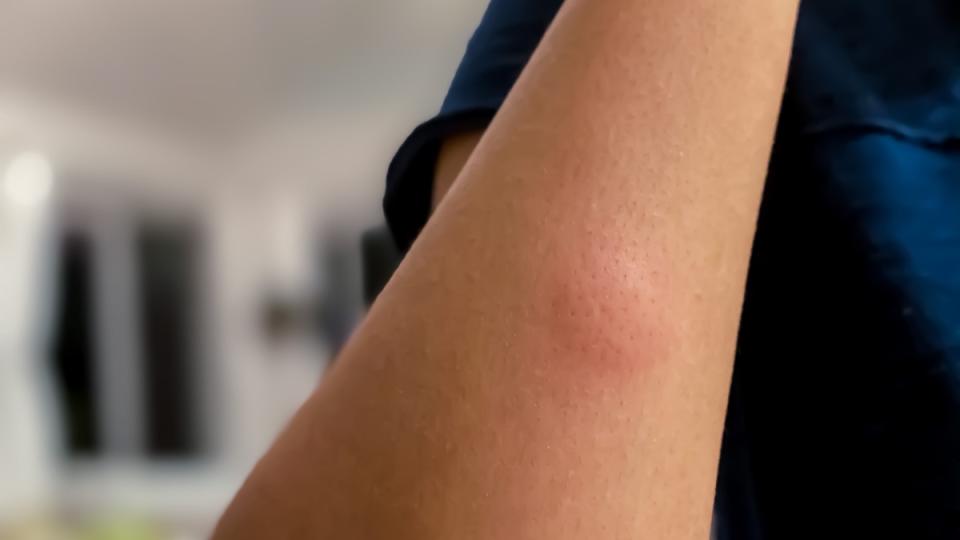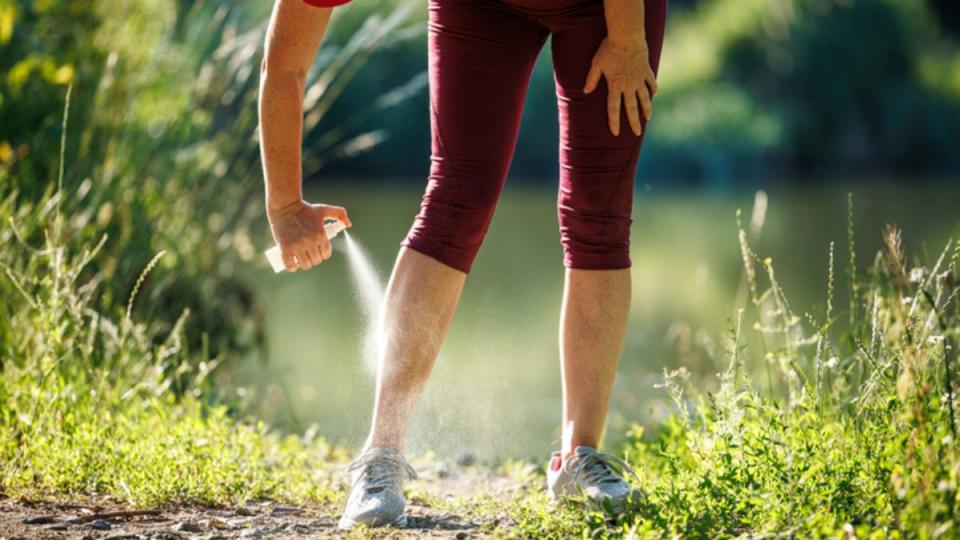Is Your Mosquito Bite Infected? How To Tell if It’s Cellulitis + Ways To Speed Healing
While warmer weather brings more opportunity to spend time outdoors, it also comes with drawbacks like pesky bugs. And when those bugs — particularly mosquitoes — bite, the result can be, at best, an itchy annoyance. But at worst, an infected mosquito bite can cause cellulitis.
“Mosquito bites are a very common problem during the summertime particularly, and they're more than just a nuisance,” says John E. Wolf, Jr., MD, MA, professor of dermatology at Baylor College of Medicine. “They can lead to significant problems such as infections like cellulitis, as well as allergic reactions.”
But how does an infected mosquito bite cause cellulitis? And what exactly is cellulitis in the first place? We spoke to board-certified dermatologists to learn what to look out for and how to repel the troublemaking bugs.
Certain people naturally attract mosquitos
Feel like every time you step outdoors you're a magnet for mosquitos? There's a reason for that. According to Alison Ehrlich, MD, MHS, dermatologist at Foxhall Research Center, some people’s bodies naturally attract the blood-thirsty bugs.
“Mosquitoes can detect certain chemicals that are released by people: Carbon dioxide, lactic acid and other volatile organic compounds,” she says. “The concentration and ratios of chemical attractants and heat released by people are variables that factor into likelihood of mosquito bites. These insects relay on stimuli such as humidity, heat, visual and olfactory signals to determine the path they travel and the location of humans hosts.”
Dr. Wolf says that pheromones may play a role in making some people more appealing to mosquitoes, too. “It’s believed that some people’s skin will secrete pheromones or other chemicals that attract insects,” he says. “Those people are more prone to get bitten.”

Mosquitos are most active at dawn and dusk
Mosquitoes are cold-blooded, meaning their body temperature is essentially the same as their surroundings because they can't regulate it on their own. Because of that, mosquitoes prefer warmer temperatures, with around 80 degrees Fahrenheit being ideal. They can become lethargic at 60 F. And when the temperature drops to 50 F or below, they usually die off.
For that reason, mosquitoes tend to be more active around dawn and dusk in the warmer months. “Mosquitoes don't like 100-degree temperatures either, so you're less likely to get bitten by a mosquito at noon than you are at 5 o'clock in the afternoon,” Dr. Wolf says.
Telltale signs of a mosquito bite
When mosquitoes bite, they pierce the skin with their proboscis to suck blood. At the same time, the insect injects saliva into the skin, causing irritation that can include:
Itching
A puffy, red bump
A hard, itchy, reddish-brown bump
Multiple bumps that appear a day or two after the bite
Small blisters
“Mosquito bites do not have a uniquely characteristic appearance,” Dr. Ehrlich explains. “Initially they can appear as a small pink bump. If the person who was bitten is sensitized, over several hours they may develop a pink, swollen area around the initial bite.”

See also: These Are the Best Home Remedies for Poison Ivy + One OTC That May Worsen Irritation
How can an infected mosquito bite cause cellulitis?
Cellulitis is a bacterial infection of the skin and soft tissue. It occurs when bacteria enters the body via a wound such as a mosquito bite. Generally, cellulitis remains localized, but it can spread if left untreated.
“It usually looks like a round area that's red and warm and frequently tender, and it can expand out from where the bite takes place,” Dr. Wolf says. “The bite will frequently be right in the center, and then you'll have this erythematous [skin redness] halo spreading out from where the bite took place.”
A simple mosquito bite typically won’t advance to cellulitis. The complication usually arises after scratching and breaking the skin on or around the bite. “The insect bite causes an inflammatory reaction in many people,” Dr. Ehrlich says. “This reaction is thought to be due to sensitivity to toxins found in mosquito saliva. When the area is scratched, the skin is damaged, and this allows bacteria to enter.”
See also: Doctors Say These Kitchen Staples Speed Healing of a Painful Skin Ulcer
Signs of cellulitis caused by infected mosquito bite
Dr. Ehrlich says there are several signs and symptoms of cellulitis that can occur when you have an infected mosquito bite. They can include:
Warmth
Pain
Spreading redness of the skin
Swelling of the limb
Fever
Chills
“All symptoms do not need to be present to make the diagnosis,” she says. “And in general, mosquito bite reactions occur in a few hours versus cellulitis, which develops over several days.”
As Dr. Wolf adds, “the biggest underlying message is that an insect bite can be uncomfortable, but it can be more than a nuisance. It can lead to significant infections if it gets worse, so you should definitely see a doctor if the bite isn’t healing.”
Check out the video below to learn more about how a mosquito bite can lead to an infection such as cellulitis.
How is cellulitis from an infected mosquito bite treated?
Once diagnosed, cellulitis caused by infected mosquito bite is generally treated with oral antibiotics. In more serious cases, your doctor may recommend intravenous antibiotics. Dr. Wolf adds that cellulitis and allergic reactions to mosquito bites can sometimes present in similar ways. In that case, he uses a two-prong approach.
“If you see something that could be an infection but you’re not sure, then most people are going to treat for the infection because that's the more serious problem,” he explains. “If I'm not sure if it's infected or a reaction, I put them on an antibiotic to cover the infection and an antihistamine for the allergic reaction and treat both at the same time. There's no really easy way to be 100% sure on cellulitis.” (See how antihistamines can help treat conjunctivitis, too.)
Cellulitis should begin to improve within one to three days after starting antibiotics, although symptoms can persist for two weeks. If symptoms worsen, immediately contact your physician. “Untreated cellulitis can lead to more serious life-threatening systemic infections by spreading to the blood,” Dr. Erhlich reveals.
Along with antibiotics, there are several tricks to help speed recovery:
For infections in the arm or leg, keep the affected limb elevated
Keep the mosquito bite area clean by washing with soap and water
Be sure to thoroughly wash hands before touching the affected area
Dr. Wolf says topical antibiotic creams such as bacitracin and Neosporin can also be helpful in the early stages of infection. “Ask a pharmacist for a recommendation,” he says. “You can use a topical antibiotic, which you can get over the counter.”
How to prevent a mosquito bite that may cause cellulitis

Sounds obvious, but one of the best ways to ensure a mosquito bite doesn’t cause cellulitis is by not getting bitten in the first place. While avoiding being outside around dusk and dawn can help you sidestep mosquitoes, that's not always possible. What else can help?
1. Use insect repellants
Most contain the chemical DEET, which has long been used as a mosquito repellant. While the Environmental Protection Agency says DEET is not harmful when used correctly, there are also DEET-free repellant options for those who prefer to avoid or are irritated by DEET.
2. Wear loose-fitting clothing
Mosquitoes can bite through tight-fitting clothing such as leggings and yoga pants. A better bet if you'll be in areas where mosquitos are active? Wear loose-fitting items that cover the arms and legs.
3. Spritz lemon eucalyptus oil
Research in the Journal of the American Mosquito Control Association found that a mixture of 32% lemon eucalyptus essential oil and a carrier oil repels 95% of mosquitoes for up to three hours. Create your own blend by mixing 1/3 of the oil with 2/3 of a carrier oil (like jojoba oil) and spritzing it over your skin before heading outdoors. (Learn how to use essential oils to make a natural spider repellent, too.)

4. Apply catnip oil
Though it may attract cats, nepetalactone — the essential oil that gives catnip its smell — is about 10 times more effective at repelling mosquitoes than DEET, Iowa State researchers report. Mix a couple of drops of the oil with water to make a DIY spray. Or simply crush fresh catnip in your hands and rub the oil releases over your skin.
“You want to try to prevent the bite,” Dr. Wolf reiterates. “Wear insect repellents and protective clothing, and avoid going out when mosquitoes are most active.”
For more ways to ward off skin infections and other painful bothers:
Skip a Trip to the Doctor’s Office — You Can Heal an Infected Hangnail at Home in 4 Easy Steps
Eye Docs’ Top Tips to Get Rid of a Stye Fast — Plus the One Thing You Should Never Do
Doctors Say These Kitchen Staples Speed Healing of a Painful Skin Ulcer

